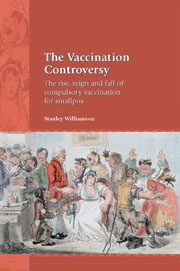19 - A Genuine Conscientious Objection
from Part III - The Retreat from Compulsion
Summary
Although no legislation on the subject of vaccination was enacted between 1871 and 1898, apart from the short Act of 1874, which was designed to clarify the Act of 1871, the anti-vaccination movement continued to bring the opposition to compulsion before the House of Commons, concentrating mainly at first on the question of repeated penalties for default. Three attempts in six years to amend the law ‘so far as accumulating penalties are concerned’ made no progress. There was considerable astonishment and derision when in 1880 J. G. Dodson, President of the Local Government Board in Gladstone's second administration, appeared to be doing the anti-vaccinationists' work for them by introducing a Bill to limit penalties, virtually along the lines of its predecessors. The Lancet explained that although it was generally regarded as ‘a Bill for the evasion of vaccination’ it had in reality ‘a different and more commendable object – namely the abatement of the nuisance of the so-called “vaccination martyrs”’. The Lancet was prepared to support the Bill: ‘Take away the element of “martyrdom” and interest in these self-cultivated sufferers will collapse […] Conscientious parents will continue to put their faith in vaccination.’ This degree of confidence was not widely shared and when the medical profession threatened all-out opposition to a ‘bill for promoting smallpox’ Dodson withdrew it.
The leading anti-vaccinationists now decided to change their tactics and demand total repeal of the compulsory clauses of the Acts, not in the hope of achieving it at this stage but with the intention of arousing public interest and inducing the government to set up a Royal Commission to investigate the whole subject.
- Type
- Chapter
- Information
- The Vaccination ControversyThe Rise, Reign and Fall of Compulsory Vaccination for Smallpox, pp. 233 - 238Publisher: Liverpool University PressPrint publication year: 2007



